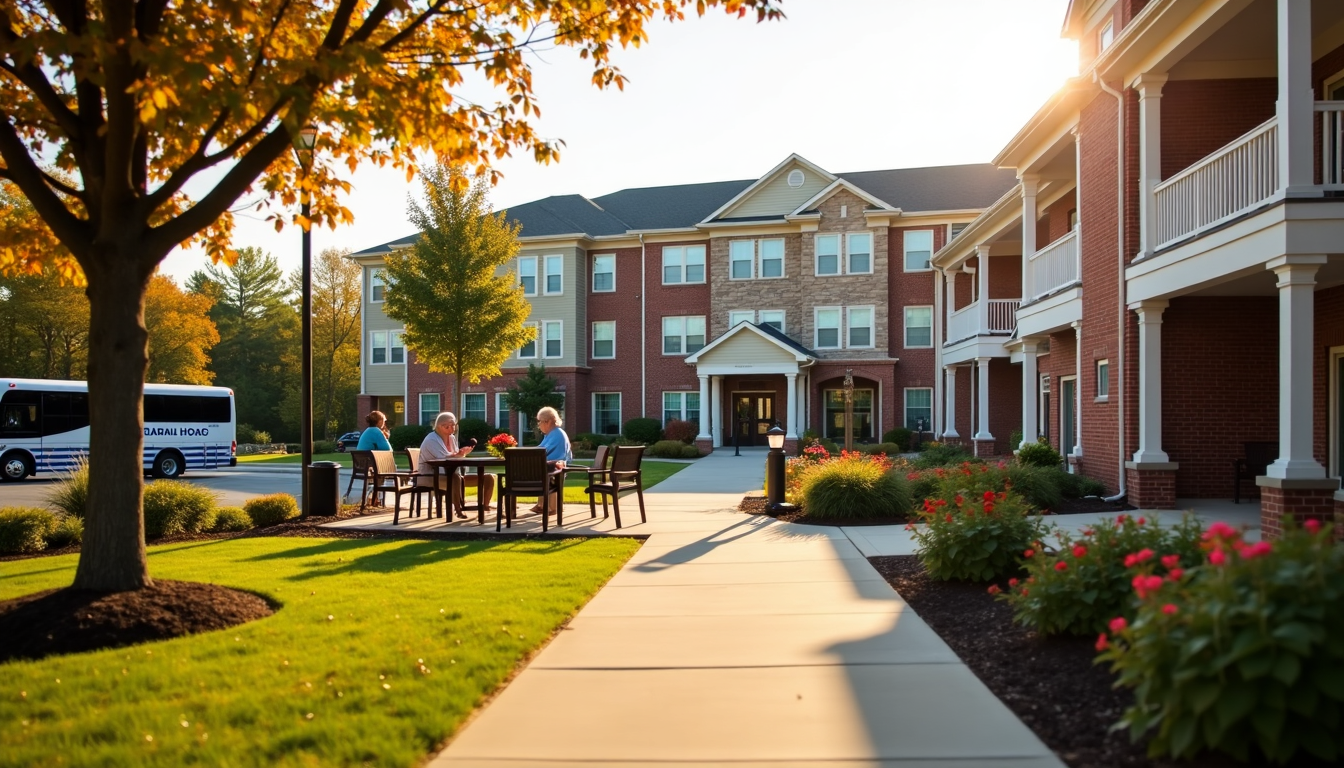Choosing the right assisted living environment is pivotal for ensuring the well-being and satisfaction of seniors, with Presbyterian Senior Living setting itself apart through a combination of compassionate care, spiritual nourishment, and comprehensive services. As a non-profit organization, Presbyterian Senior Living stands on the principles of the Presbyterian Church, integrating values like compassion, dignity, and respect into every aspect of care. This unique blend not only supports the physical and medical needs of residents through skilled nursing, medication management, and access to physical and occupational therapy but also caties to their spiritual well-being with worship services, bible studies, and a supportive community atmosphere. The importance of selecting a senior living service that aligns with personal values and offers excellence in care cannot be overstated, making Presbyterian Senior Living a significant choice for many families.
This article will explore the critical aspects of Presbyterian Senior Living that enhance the assisted living experience, including the importance of faith-based senior care, unique features of Presbyterian assisted living communities, and how to choose the best community for individual needs. Additionally, it will address financial considerations, such as Medicare, long-term care insurance, and the benefits of choosing a non-profit organization for senior care. Through a detailed examination of services like personal care, memory care, wellness programs, and the additional amenities available in a Presbyterian retirement home, readers will gain a comprehensive understanding of how Presbyterian Senior Living not only meets but exceeds expectations in providing a safe, enriching, and nurturing environment for seniors.
The Importance of Faith-Based Senior Care
Spiritual Support
At Presbyterian Senior Living, spiritual support is integral, offering residents opportunities for worship, pastoral care, and religious studies. This engagement with spirituality often leads to improved quality of life, as residents find comfort and purpose in their daily activities. Faith-based practices, such as Bible studies and prayer groups, not only foster personal growth but also enhance cognitive health, slowing decline and stabilizing conditions like dementia.
Community and Belonging
Being part of a faith-based community provides a profound sense of belonging and prevents feelings of isolation and depression among seniors. Presbyterian Senior Living cultivates an inclusive environment where every individual is respected and valued, promoting diversity through various programs. Social interactions are encouraged, with activities designed to strengthen bonds and ensure that every resident feels an integral part of the community.
Enhanced Well-Being
The comprehensive approach at Presbyterian Senior Living ensures that spiritual, mental, and physical health are all addressed, leading to better overall health outcomes. Engaging in spiritual activities has been shown to foster a hopeful outlook on life, which correlates with reduced risks of depression and anxiety. Moreover, the sense of purpose gained through faith can lead to healthier lifestyles and improved coping strategies in dealing with life’s challenges.
Unique Features of Presbyterian Assisted Living
Presbyterian Assisted Living communities stand out by integrating Christian values into everyday life, ensuring that faith remains a cornerstone of the resident experience. These communities offer unique features that cater specifically to the spiritual and daily living needs of their residents.
Daily Worship Opportunities
Residents have access to a variety of daily worship opportunities, which are central to life in Presbyterian communities. These include on-site services led by ordained clergy and non-denominational programs. Regular weekly religious services are held on campus, providing a space for spiritual renewal and community gathering.
Faith-Centered Activities
The CHOICES program enriches the spiritual life of residents through a range of faith-based activities. These include Bible study groups, prayer circles, and spiritually uplifting activities designed to engage residents and foster a sense of belonging and purpose. These programs not only support spiritual growth but also enhance cognitive health.
Pastoral Care
Comprehensive pastoral care is available to all residents, offering spiritual support during times of health crises and end-of-life situations. This care is provided through experienced chaplains who offer confidential counsel, prayer, and spiritual comfort. Additionally, the community supports residents in maintaining connections with their faith communities outside the assisted living setting.
Presbyterian Assisted Living communities ensure that every aspect of care is infused with compassion, dignity, and respect, reflecting their Christian heritage and commitment to enhancing the quality of life for all residents.
Choosing the Best Presbyterian Assisted Living Community
Evaluating Care Needs
When selecting a Presbyterian Assisted Living Community, it’s crucial to assess the level of care required. While personal care communities offer support for daily activities, assisted living provides more intensive medical attention for longer durations. Understanding these differences ensures that the community can adequately meet the specific health and wellness needs of the individual.
Considering Location and Amenities
The location of the assisted living community is a significant factor. Choosing a conveniently located community ensures easy access for family visits and proximity to essential services like healthcare facilities. Additionally, evaluate the amenities offered, such as meal services, housekeeping, and transportation, which contribute to a comfortable and supportive living environment.
Reading Reviews and Testimonials
Gathering insights from current residents and their families through reviews and testimonials is invaluable. These firsthand accounts provide a glimpse into the community’s atmosphere, the quality of care provided, and the overall satisfaction of residents, aiding in making a well-informed decision.
Financial Considerations for Presbyterian Assisted Living
Average Costs
Financial planning for assisted living involves understanding the various cost factors. The average monthly expense for assisted living communities, such as those under Presbyterian Senior Living, can vary significantly based on location, level of care, and amenities provided. For instance, in Illinois, the average monthly cost was $4,170 in 2019, while the national median is projected to reach $5,511 by 2024. Costs include housing, daily living assistance, some meals, utilities, and community programs.
Insurance and Payment Options
Presbyterian Senior Living accepts multiple forms of payment including Medicare, private pay, and Supplemental Security Income (SSI). Additionally, Presbyterian Medicare Advantage plans offer comprehensive coverage with many services available at low or no additional cost, such as routine medical visits, dental care, and vision exams.
Financial Aid and Subsidies
The Assistance Program from the Board of Pensions of the Presbyterian Church (U.S.A.) provides substantial support to eligible members. This includes monthly Housing Supplements, emergency grants, and adoption assistance. Notably, monthly housing costs up to $4,400 for individuals and $8,800 for couples are considered, with ongoing eligibility dependent on financial circumstances. Further, one-time financial aids like the lump-sum Housing Supplement of up to $20,000 help with entrance fees to retirement facilities, ensuring financial accessibility for retirees and their spouses.
Conclusion
Throughout this discussion, we have explored how Presbyterian Senior Living provides a supportive and enriching environment for seniors, integrating spiritual nourishment, comprehensive care, and a sense of community. Evidently, the alignment with Presbyterian values ensures that every aspect of assisted living, from spiritual support to personalized care plans, is handled with compassion, dignity, and respect. This commitment not only addresses the physical and medical needs of the residents but also their spiritual well-being, demonstrating a holistic approach to senior care.
Selecting the right assisted living community is a pivotal decision for families and their loved ones, and Presbyterian Senior Living stands out as a choice that can significantly enhance the quality of life for seniors. By offering a blend of faith-based care, diverse amenities, and robust support systems, these communities not only meet but exceed expectations. The information discussed here underscores the importance of making an informed decision, with Presbyterian Senior Living exemplifying how values and care can come together to offer a fulfilling living experience for seniors.
FAQs
What are the main considerations when evaluating an assisted living facility?
When assessing an assisted living facility, it is essential to consider three primary factors:
- The level of care that the facility provides.
- The safety and security measures that are implemented.
- The quality of the staff who will be caring for residents.
What are the benefits and drawbacks of assisted living for seniors?
Assisted living offers several advantages for the elderly, such as assistance with daily tasks, opportunities for social engagement, and enhanced safety features. However, there are also some disadvantages, including the costs involved, potential issues with privacy, and the variability in medical care options available at different facilities.
How is an assisted living experience defined?
Assisted living is designed to support older adults by offering more assistance than independent living, yet it does not provide as comprehensive support as nursing homes or memory care facilities.
What typical services are offered by assisted living facilities?
Assisted living facilities typically provide a range of services that include:
- Assistance with personal care activities like bathing, dressing, and grooming.
- Help with moving around and transferring from one place to another.
- Provision of meals and snacks.
- Regular housekeeping and laundry services. These services are included in the monthly cost, which can vary depending on whether the accommodation is a private or shared bedroom, or a full apartment.












